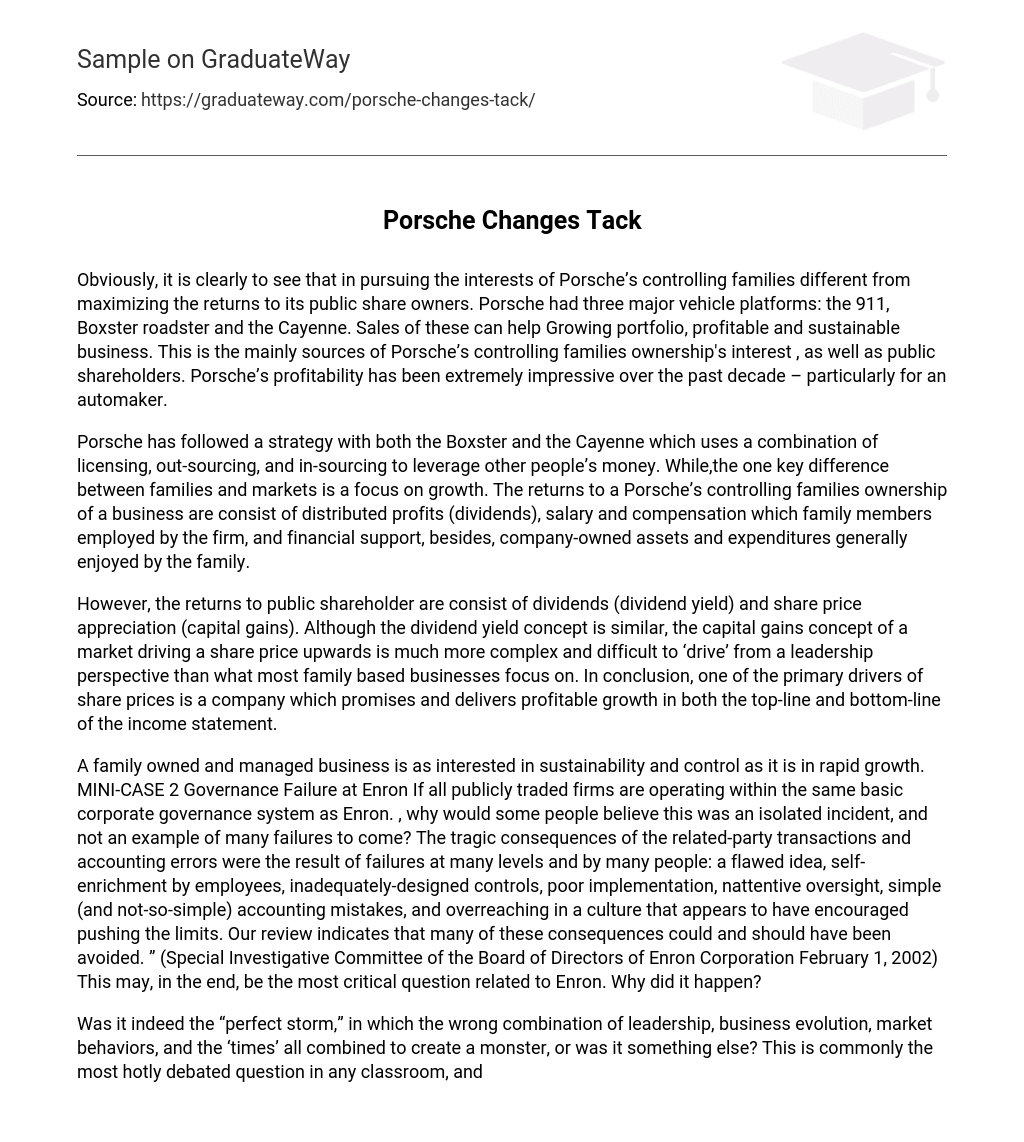Obviously, it is clearly to see that in pursuing the interests of Porsche’s controlling families different from maximizing the returns to its public share owners. Porsche had three major vehicle platforms: the 911, Boxster roadster and the Cayenne. Sales of these can help Growing portfolio, profitable and sustainable business. This is the mainly sources of Porsche’s controlling families ownership’s interest , as well as public shareholders. Porsche’s profitability has been extremely impressive over the past decade – particularly for an automaker.
Porsche has followed a strategy with both the Boxster and the Cayenne which uses a combination of licensing, out-sourcing, and in-sourcing to leverage other people’s money. While,the one key difference between families and markets is a focus on growth. The returns to a Porsche’s controlling families ownership of a business are consist of distributed profits (dividends), salary and compensation which family members employed by the firm, and financial support, besides, company-owned assets and expenditures generally enjoyed by the family.
However, the returns to public shareholder are consist of dividends (dividend yield) and share price appreciation (capital gains). Although the dividend yield concept is similar, the capital gains concept of a market driving a share price upwards is much more complex and difficult to ‘drive’ from a leadership perspective than what most family based businesses focus on. In conclusion, one of the primary drivers of share prices is a company which promises and delivers profitable growth in both the top-line and bottom-line of the income statement.
A family owned and managed business is as interested in sustainability and control as it is in rapid growth. MINI-CASE 2 Governance Failure at Enron If all publicly traded firms are operating within the same basic corporate governance system as Enron. , why would some people believe this was an isolated incident, and not an example of many failures to come? The tragic consequences of the related-party transactions and accounting errors were the result of failures at many levels and by many people: a flawed idea, self-enrichment by employees, inadequately-designed controls, poor implementation, nattentive oversight, simple (and not-so-simple) accounting mistakes, and overreaching in a culture that appears to have encouraged pushing the limits. Our review indicates that many of these consequences could and should have been avoided. ” (Special Investigative Committee of the Board of Directors of Enron Corporation February 1, 2002) This may, in the end, be the most critical question related to Enron. Why did it happen?
Was it indeed the “perfect storm,” in which the wrong combination of leadership, business evolution, market behaviors, and the ‘times’ all combined to create a monster, or was it something else? This is commonly the most hotly debated question in any classroom, and often is the concluding thought for further debate. Many argue that although many of the corporate governance and regulatory systems failed in the case of Enron, the core cause was human failure – the failure of leadership in many organizations to do the numbers, know the law, and do the right thing.
Some would believe that this was an isolated incident because the executive leadership not only was unethical in its business dealings but criminal in its fraudulent transactions meant to disguise poor performance. Although other companies fell into the same traps as Enron, these same companies also had criminals running the enterprise: for example, Tyco with Dennis Kozlowski and WorldCom with Bernie Ebbers. The overarching concern for profit above all else became greed on criminal proportions.
As Eiteman et al suggest, “This destructive short-term focus by both management investors has been correctly labeled impatient capitalism” (p. 26). Congress did respond to Enron’s failures and those of other companies by passing SOX in 2002. SOX stands for Sarbanes-Oxley, which now required for key elements, which are paraphrased below: 1. CEO/CFO sign-off of financial statements 2. Audit/Compensation committees must be independent 3. No loans may be given to corporate officers (Tyco had this issue) 4. Proper controls to assess fraud must be in place
Although SOX aimed to bring greater accountability to public corporations, it has been costly and not well-accepted globally. Some would believe that this was an isolated incident because the executive leadership not only was unethical in its business dealings but criminal in its operations, and they were able to convince their workers and business associatesto deceive and undermine the systems at play, actively practicing fraudulent transactions, meaning to disguise poor performance and deceive the investors and the public at large.
The reality is that prior to this incident there wasnever a case of this magnitude, the perception held by most are that the governance systems then extend from thecorporate walls of companies to the electric barriers of the company’s regulators and the government itself, are full proof. The belief is that it is a near impossible occurrence and any occurrence is the exception.
Although other companies fall into the same traps as Enron, these companies also have dishonest individualsrunning the enterprise: criminal success at this level calls for collusion, the power to get individuals andorganizations to buy into your thinking, for example, Tyco with Dennis Kozlowski and WorldCom with BernieEbbers. The overarching concern for profit above all else became greed on criminal proportions. As Eiteman et alsuggest, “This destructive short-term focus by both management investors has been correctly labeled impatientcapitalism” (p. 6). The response by congress to Enron’s failures and those of other companies by passing SOX in 2002, now requiresfor key elements, these are: CEO/CFO sign-off of financial statements, Audit/Compensation committees must beindependent, No loans may be given to corporate officers (Tyco had this issue), Proper controls to assess fraud must be in place. Although SOX aimed to bring greater accountability to public corporations, it has been costly and notwell-accepted globally.





